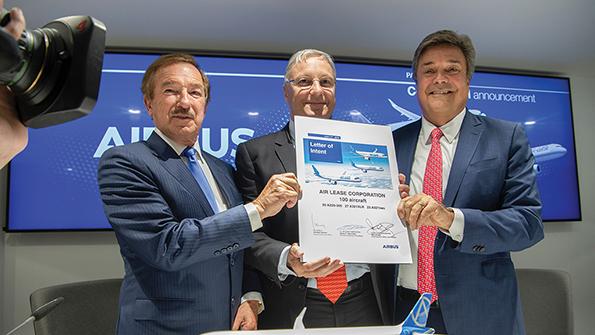Aircraft Leasing Sector Struggling With Own Success

Lessors have been around for a long time. The concept began to gain traction in air transport in the 1970s. Since that time, true powerhouses such as AerCap, GECAS, Air Lease Corp. (ALC) and Avolon have emerged. Their success has attracted more investors and money to the industry, with an abundance of available global capital seeking seemingly secure homes. The number of lessors with large portfolios of aircraft has doubled in a few years.
Lessors placed about 30% of direct Boeing orders at their peak in 2017, but the number has since declined. In addition to placing orders with the OEMs, lessors routinely buy large portfolios of aircraft in sale-and-leaseback deals with airlines, then trade those portfolios with each other.
Lessors have proven to be an attractive sales channel for Airbus and Boeing, driving growth alongside emerging low-cost carriers such as Lion Air and IndiGo.
For investors, aircraft seem to be really attractive assets. Unlike many other assets, they can be moved around worldwide if a placement proves unsuccessful. That perceived attractiveness has pulled in money, though not always smart money.
But the leasing sector is increasingly becoming the victim of its own success. A growing number of its leaders are saying it is time for an adjustment. Has the leasing concept gone too far?
There are some basic numbers on which the industry agrees: “Lessors make good money if the leasing share is below 30%; it becomes difficult above 40%,” says Timothy Ross, BOC Aviation’s head of investor relations. “We are in an oversupply situation,” he says, due to many new lessors having aggressively entered the market over the last few years. “There were 6-8 lessors 10 years ago. Now there are twice that number,” he adds.
AerCap CEO Aengus Kelly says overexposure to the lessor channel has led to an influx of “incompetence” in the market. “[Aircraft manufacturers] have given the product to incompetent players,” he contends. Inexperienced lessors are often unaware of the intricacies of even preparing for entry into service, such as ordering interiors on time, he notes. With too many lessors competing for airline deals, the small new players will often offer bargain rates too soon and destroy the market for everyone else.
“Airlines have been getting unbelievably attractive sale-and-leaseback deals,” says Avolon CEO Domhnal Slattery. Of course, this was before the Boeing 737 MAX grounding. Since the aircraft is temporarily off the market, it is all but impossible to agree on any type of lease deals because its return-to-service timing is still unclear. At the same time, lessors with A320neo orders have been unable to benefit much from the grounding because they have few, if any, aircraft available to place in the short term—and Airbus production delays are not helping.
The situation is made even more complex by the recent COVID-19 outbreak that has left many lessors scrambling to place surplus aircraft from Asia-Pacific fleets with customers in other regions desperate for backup capacity available to fill gaps created by the MAX grounding. Financially strong lessors such as ALC or AerCap are sometimes prepared to assist airline customers by allowing them to temporarily defer lease payments.
Even in normal times. the major players would prefer to face only each other. “Competing against grown-ups is better,” Ross says. “Inexperienced lessors tend to panic quickly and talk about price first.” But there are many other levers in lease contracts that are important, too—return conditions and currency hedges being just two that require the complex deal structuring of which many new players are simply incapable.
This is an abbreviated version of an article by Jens Flottau that appeared in Aviation Week & Space Technology. Subscribers can read about how the industry “was saved by incompetence” and other issues around leasing in the full article.